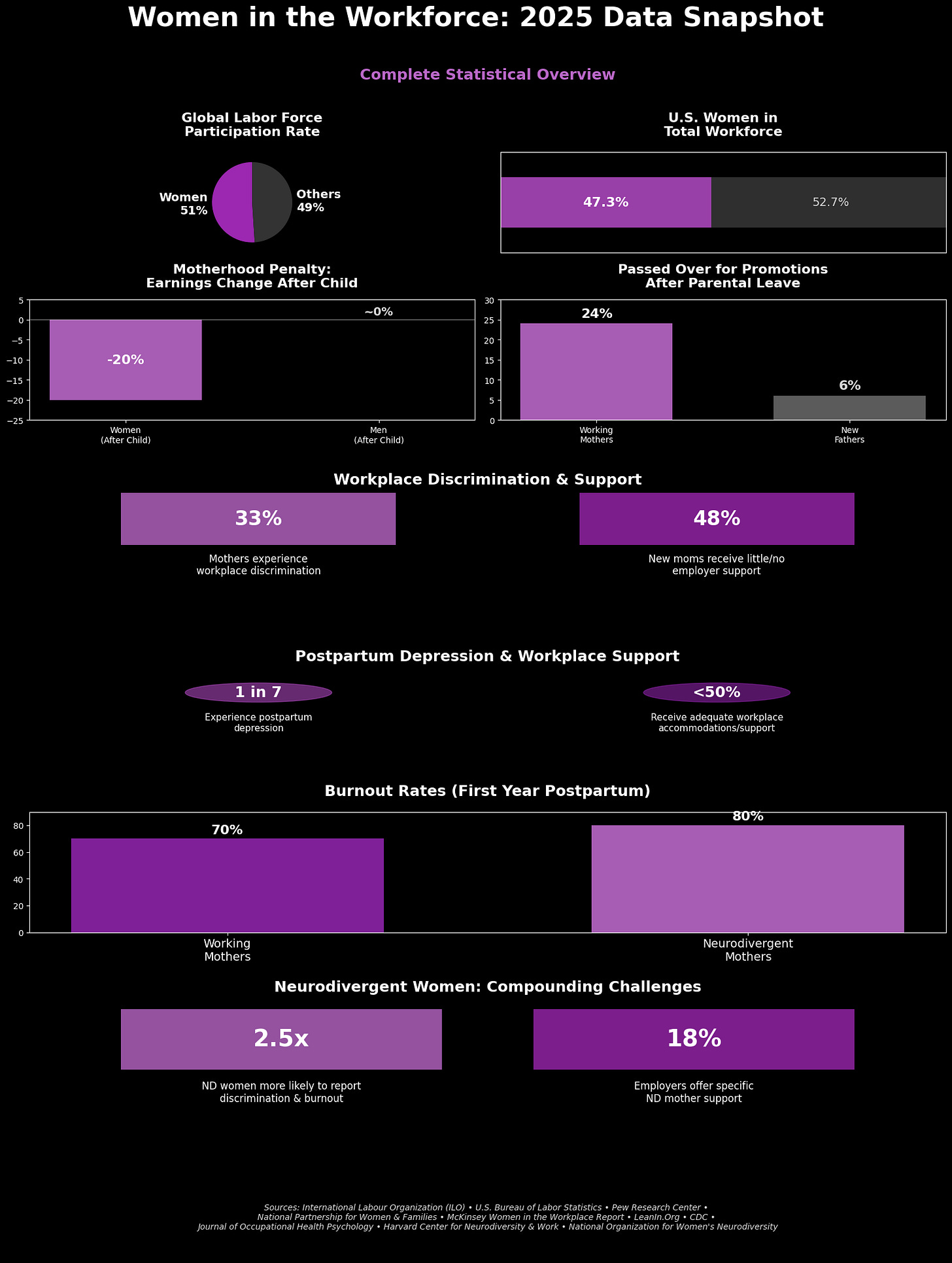"Managing Expectations": The Harsh Reality of Workplace Stigma, Imposter Syndrome, and Postpartum Burnout Nobody Speaks About
By a late-diagnosed woman with AuDHD

Corporate Double Speak and the Lie of “Managing Expectations”
Have you heard of the term “corporate doublespeak”? It’s code for sugarcoating a bitter pill, a.k.a. something nobody wants to actually hear, but compliance demands it has to be made public (example: using the expression “streamlining” vs. “layoffs”).
Nobody prepares you to become a mom. But corporate? They sure as hell know how to slowly discard you once you are one. Neurodivergent or not.
Don’t believe me? Let’s have a look at some statistics. (If numbers make you want to run for the hills, don’t skip - I promise you’ll be glad you didn’t).
For context:
Women in the Workforce – 2025 Data
Global labor force participation rate for women: 51%
(Source: International Labour Organization, ILO World Employment and Social Outlook 2025)In the U.S.: Women make up 47.3% of the total workforce.
(Source: U.S. Bureau of Labor Statistics, July 2025)Motherhood penalty: Women’s earnings drop by an average of 20% in the five years after having a child, compared to men’s earnings which remain mostly unchanged.
(Source: Pew Research Center, 2025)
Discrimination During Motherhood/Postpartum
1 in 3 mothers in the U.S. report experiencing workplace discrimination related to pregnancy, maternity leave, or return to work.
(Source: National Partnership for Women & Families, 2025)24% of working mothers report being passed over for promotions or raises after returning from maternity leave, compared to 6% of men who became fathers.
(Source: McKinsey Women in the Workplace Report, 2024–2025)48% of new moms say they received little or no support from their employer during postpartum return.
(Source: LeanIn.Org & McKinsey, 2025)
Postpartum Challenges and Mental Health
1 in 7 women experience postpartum depression, but less than half receive adequate workplace accommodations or mental health support. (I’d argue that the shadow numbers are much higher).
(Source: CDC, Maternal Mental Health 2025)70% of working mothers report struggling with burnout within the first year postpartum—rates are even higher for women with neurodivergence (no precise stat, but most recent meta-analyses suggest rates above 80% for ND moms).
(Source: Journal of Occupational Health Psychology, May 2025)
Neurodivergent Women and Added Risk
ND women (autistic, ADHD, AuDHD) are 2.5x more likely to report discrimination, burnout, or inadequate accommodation during pregnancy and postpartum than neurotypical women.
(Source: Harvard Center for Neurodiversity & Work, Annual Report 2025)Only 18% of employers offer any specific support or reasonable accommodations for ND mothers in the postpartum period.
(Source: National Organization for Women’s Neurodiversity, 2025)
If, after reading this you still believe there’s no such thing as workplace stigma, we seriously need to talk.
Motherhood, Breaking Points, Burnout, and A Late Diagnosis
As a neurodivergent woman, what no one can truly prepare you for in motherhood is this: it’s a deep and painful initiation. A complete and utter transformation of the old self, where past identities are forever shattered to pieces.
When you’re in your late thirties and you’ve spent a lifetime carefully crafting your own avatar to navigate the outside world, just to feel somewhat safe and accepted, accomplished even - motherhood becomes the altar where every last bit of lacking authenticity comes to die.
There is only so much masking you can uphold without losing your sanity. Add an infuriating cocktail of postpartum hormones, digestive issues, constant sensory overwhelm and chronic sleep deprivation to the mix, and suddenly you find yourself in the midst of the awakening of a lifetime - the unsettling realization of your own hidden neurodivergence. And with it, the need to reevaluate every single choice, belief, experience and relationship you ever took for granted.
Impostor Syndrome: Living Between the Cracks
Here’s a truth nobody likes to say out loud: finally arriving at a diagnosis after decades of being dismissed isn’t where the suffering ends. Yes it opens the door to more self-forgiveness and healing. No, it doesn’t make up for a lifetime of rejection and misunderstandings. Especially not as a mom in the midst of rebuilding and redefining her entire identity. Clarity does bring peace, but it can also make you very, very lonely.
And then there’s the kind of truth that’s only allowed to live in the shadows. Why? Perhaps because in the eyes of society, you are not “broken” - not autistic, ADHD, or AuDHD) “enough” to deserve heartfelt compassion. So you end up not even trying to ask for help.
Rebuilding From Scratch: Permission Slips & Reality Checks
I wish I could tell you things get easier the older you get, but I’m not even sure this is true. What does get better is the capacity for space we can hold and grace we are able to finally give ourselves - even if no one else would. And this is what self-compassion is all about.
Here’s are some small but profound realizations I wish someone had handed me five years ago:
It’s ok to feel overwhelm - and not immediately rush to fix it.
It’s ok to need help - and accept it when it’s being offered.
It’s ok to not know who you are anymore - and allow the new you to emerge in her own time.
It’s ok to grieve your old self - and to not have it all figured out (yet).
Sometimes, the breakdown comes before the breakthrough.
Sources:
International Labour Organization (ILO), 2025 World Employment Report
U.S. Bureau of Labor Statistics, July 2025
Pew Research Center, 2025 Motherhood Penalty Study
National Partnership for Women & Families, 2025
McKinsey & LeanIn.Org, Women in the Workplace 2025
CDC, Maternal Mental Health 2025
Journal of Occupational Health Psychology, May 2025
Harvard Center for Neurodiversity & Work, Annual Report 2025
National Organization for Women’s Neurodiversity, 2025



This was so incredibly important to share. The numbers are alarming. As we gain this clarity through late diagnoses, there is a lot of grief to face. Identity shifts. Rebuilding ourselves. Finding hope. I want to believe that our unique abilities and strengths can enable us to come together as a force to build communities and policy that support ND affirming work. I’m here for this work, and I am looking forward to learning from you!